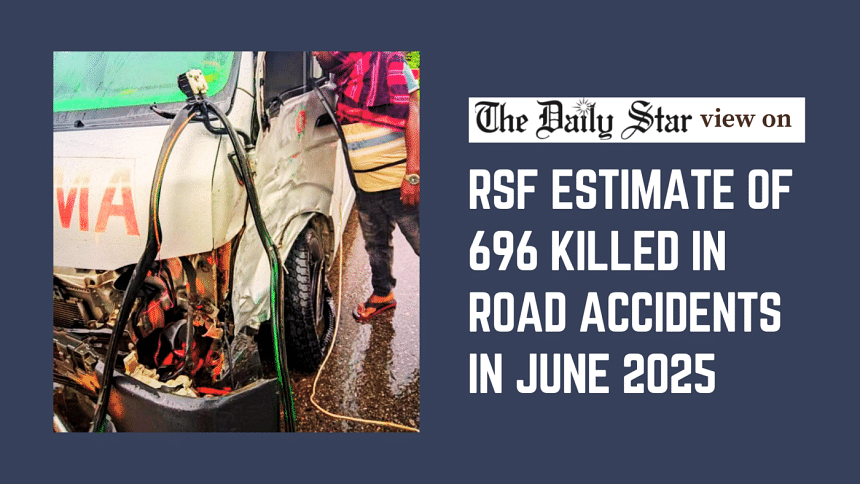Time to end the carnage on our roads

Despite countless lives being lost in road crashes across the country year after year, it is astounding that the crisis continues to be met with a shocking level of indifference or ineffectiveness from those responsible for road safety. According to the latest data from Road Safety Foundation (RSF), at least 696 people were killed in June. That is, mind you, an average of over 23 lives lost every day. For context, as per Bangladesh Jatri Kalyan Samity, 614 people were killed in May and 583 in April. While the June data was likely influenced by increased road trips during the extended Eid-ul-Azha holiday, the overall trend points to a chronic problem that cannot be blamed on seasonal home rush alone.
These persistently grim statistics should have jolted us into decisive interventions long ago. The question is, why didn't they? A closer look at the June data reveals just how pervasive and multidimensional the crisis has become. Motorcycles—which are proving increasingly hard to regulate—alone accounted for over 37 percent of total crashes and nearly 33 percent of fatalities. Pedestrians made up more than 17 percent of the deaths, while another 15 percent were drivers and their assistants. The RSF has identified excessive speeding as the leading cause of most accidents. Other long-standing factors include unfit vehicles, poorly designed and maintained roads, unskilled and overworked drivers, weak traffic enforcement, and the widespread disregard for traffic laws.
This deadly mix has created an environment of near-total anarchy on our roads, and unless it is systematically addressed, road casualties will continue to claim lives. In this context, the government's ongoing effort to draft a new road safety law based on the UN-endorsed Safe System Approach seems like a positive step. Reportedly, a preliminary draft is currently under review. Structured around the five key pillars of this approach—safer people, safer roads, safer vehicles, safer speeds, and post-crash care—the draft law promises to address core issues that the current Road Transport Act, 2018 has failed to tackle adequately.
But let us be clear: legislation alone cannot save lives. The Road Transport Act, for all its flaws, has provisions that could have improved road safety if implemented properly. Unfortunately, it has remained largely toothless due to a lack of political will, institutional coordination, and enforcement. The same fate must not befall the new law. If passed, it must be enforced without fear or favour, and accompanied by serious investments in traffic management, public awareness, driver training, and post-crash response systems.
Given the persistent fatalities, we urge the interim government to take the crisis of road safety with the urgency it deserves. The authorities must do everything necessary to finally break the cycle of neglect and lack of accountability that has allowed so many lives to be lost in vain. There is no excuse left for inaction.


 For all latest news, follow The Daily Star's Google News channel.
For all latest news, follow The Daily Star's Google News channel. 










Comments